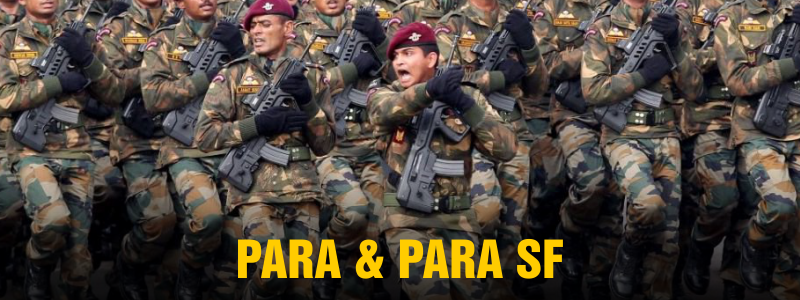Difference between PARA & PARA (SF)
Indian Army is one of the biggest and fiercest army in the world. Our Army just doesn’t have regular infantries but is equipped infantries with special purpose as well. Paratroopers or Airborne and Paratroopers (Special Forces) are such two infantries which serve the nation in intense war conditions.
In general, normal people are confused between Para and Para (SF) – but in real, functions of both of these battalions of Indian Army are quite different. Of course, the paratroopers are elite soldiers who are quite robust physically and mentally but different Parachute Special Force battalions quickly come into action for their respective specialized military tasks as per the situations.
So, let’s find out how paratroopers and paratroopers (Special Forces) are different –
Paratroopers or Airborne Unit
Normal paratroopers or airborne units encompass 4th, 5th, 6th, and 7th airborne battalions – these battalions are not the part of Special Forces. These paratroopers jump through parachute behind the enemy lines in war zone. The paratroopers attack the enemies from their back, making it easier for the conventional Army infantries in taking over the enemies in battle ground.

Paratroopers’ Probation
The paratroopers are selectively chosen from the army and paramilitary forces. The chosen soldiers then go through the robust training during their 90 days probation period. The whole training is designed to filter the weaker ones.
During this probationary assessment, aspirants have to stay awake for long time without sleeping; running long distances in extreme conditions, and go through a series of different endurance exercises in order to gain the stamina for survival in such tough conditions. However, paratroopers go through such intern probation cycle, they are still the part of “Elite Forces” not “Special Forces”.
The training for paratroopers happens at the Para Regimental Center situated in Bangalore, Karnataka. Following this training, the further Parachute training happens in Parachute Training Centre located in Agra, UP where the paratroopers receive their Para Wings. The sole purpose of this probation cycle is to make the army men physically as well as psychologically vigorous.
Well, this whole training put strong emphasis on Para Jumping with full warfare load. And after 5 successful Para Jumping and completion of the training the aspirants are commissioned in regular Paratroopers’ Battalions permanently. And, finally they earn the right to put on the maroon beret.
Parachute Battalions Special Forces
There are 6 battalions of Para (Special Forces) – 1st, 2nd, 3rd, 9th, 10th, and 21st Para Special Forces battalions. The paratroopers in these battalions are fiercer and sterner than regular paratroopers – better, sharper and robust.
Para (SF) Probation
The aspirants are chosen from the regular paratroopers and go on for another stringent training at Special Forces Training School located in Nahan, HP. After successful completion of this training the candidate joins the really elite club of Special Forces in Indian Army.
Each battalion of Para (Special Forces) is trained for different specialized environmental and territorial training. Some examples are here:
- Para 1 (SF) for mountain battle
- Para 9 (SF) for forest battle
- Para 10 (SF) for desert battle
And so on, etc.

You can easily distinguish Para (SF) from Para with their “Balidan” badge sported on their right pocket along with the Special Forces emblem on both of their shoulders. During the operation the Para (SF) commandos are dropped deep behind the warzone and the logistic supported is provided through specialized transport aircraft. The latest aerial infiltration techniques such as HALO and HAHO are applied for operation.
The Para Commandos from Special Forces conduct various operations including cross border raids, capturing or killing or destroying the target and covert operations etc. It is said that these Special Forces members may carry on their operation without any external or logistic support for up to 72 hours.








